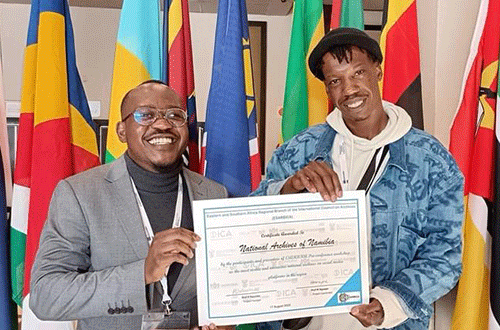Lahja Nashuuta
KLEOPHAS Mundjele is a highly skilled and versatile public servant with a strong background in IT software development, analysis and programming. He possesses solid skills in various programming languages, database management, and system architecture.
Hailing from Outapi in Omusati region, Mundjele is an analyst programmer and
the only software developer in the Ministry of Urban and Rural Development.
He is responsible for analysing system requirements, designing, developing, and implementing software solutions, and ensuring these solutions align with the ministry`s objectives.
Mundjele’s key responsibility is to ensure software applications adhere to security protocols and industry compliance standards.
“My primary focus is on understanding business requirements and translating
them into effective software solutions and to provide ongoing support for applications, addressing user issues and troubleshooting among many other responsibilities,” Mundjele reveals.
The software development maestro holds a Bachelor of Computer Science with a specialisation in software development from the Namibia University of Science and Technology.
With a solid foundation in programming languages, Mundjele has played a vital role contributing to the technological advancement and efficiency of the rural
and urban development ministry systems, and to the new website which is envisioned to be launched in the next few weeks. Additionally, his proficiency in data
analysis has proved to be a valuable asset, he said.
Through data-driven insights, Mundjele supports evidence-based decision-making within the ministry.
“This analytical approach ensures that our policies and strategies are grounded in real-world data, enhancing the effectiveness of our initiatives, under the directorate of Finance, Human Resources, Administration and Information Technology,” he said.
The hiking and go-carting lover joined the public service in April 2023. Prior to working for the government, he worked for the Namibia Statistics Agency as a system developer.
Asked why he opted to work for public service, Mundjele said: “I decided to join the public service because I am deeply committed to contributing to the well-being of our community. My experiences growing up and witnessing the impact of public policies on people’s lives sparked my interest in making a positive change. I am particularly drawn to technology as it aligns perfectly with my values and skills. I am excited about the opportunity to work on projects, and I am eager to contribute my skills to the meaningful work carried out by the Ministry of Urban and Rural Development,” he said.
Although it was not his dream to work for the government, Mundjele said he is optimistic that his skills and dedication can be best utilised in a government setting where he can actively participate in initiatives
that shape our community and address important societal issues.
Challenges
One of the most challenging aspects of his work, he said, is navigating complex integration projects.
Mundjele revealed that integrating
new software or systems with existing
ones requires a deep understanding of different technologies and attention to
detail.
“The challenge lies in ensuring seamless communication between systems,
addressing compatibility issues, and troubleshooting potential conflicts. However, I see this challenge as an opportunity for continuous learning and improvement. To overcome this, I engage in continuous training, stay informed about the latest integration tools, and collaborate closely with cross-functional teams. This not only allows me to address the challenge effectively but also contributes to my growth as a professional in this dynamic field,” he said.
Asked what he found satisfying about his job, Mundjele said: “One of the most satisfying aspects of my role is the opportunity to engage in problem-solving and innovation. I find extraordinary joy in deciphering complex challenges and creating effective solutions.
For instance, during a recent IT inventory project, we encountered a significant integration issue of merging inventory to LDAP.
Through collaboration with other developers in the industry and leveraging my analytical skills, we did not only resolve the problem but also improved the overall efficiency of the system.
These moments of overcoming challenges and contributing to the success of the project are incredibly fulfilling,” Mundjele added.
He had an opportunity to attend the ESARBICA Conference, which was held in Gauteng province, South Africa with delegates coming from all over
Africa.
“ESARBICA is a professional body
that co-ordinates activities in the management of records and archives at both regional and international levels. It was held under the theme “Archives, Records and Memory in Digital Spaces and global Chaos”.
“I was part of the Namibian team that got recognised as the most visible and interactive team,” he said proudly.
Public misconception
“In my experience working in the Ministry of Urban and Rural Development, I have witnessed a dedicated and hardworking team committed to delivering results. At our institution, there’s a collective focus on productivity and efficiency.
“We recognise the importance of providing efficient services to the public, and our team is consistently striving to meet and exceed performance expectations. We have implemented strategies to enhance our workflow and ensure that we contribute meaningfully to the ministry’s goals.
I believe it’s essential to look beyond stereotypes and recognize the diversity of roles and responsibilities within public institutions”.
He further said: “Many of my colleagues are highly skilled and committed professionals who take pride in their work. We have a culture of accountability, and our performance is regularly assessed to ensure that we are meeting the expectations set by the ministry,” he said.
Going forward
About his wish list, Mundjele mentioned strengthening his professional network within the government sector, building collaborations, sharing insights, and fostering a sense of unity with colleagues
and professionals in related fields are key aspects of his personal and professional growth.
“On a personal level, achieving a healthy work-life balance is crucial. I aim to manage my workload effectively, prioritise self-care, and strike a balance between professional responsibilities and personal well-being,” he stated.


